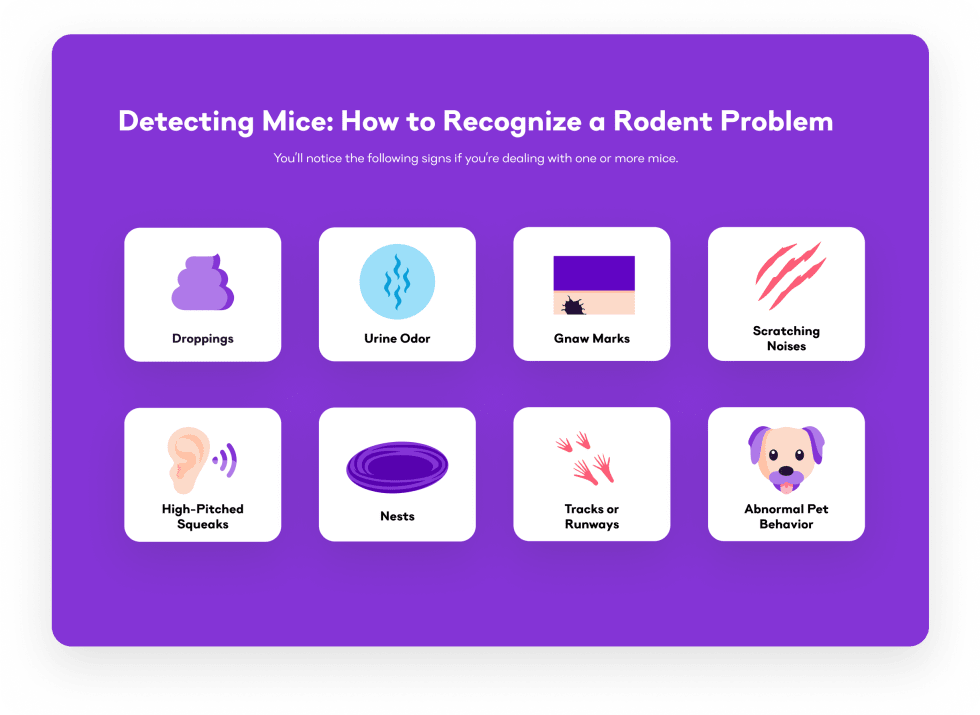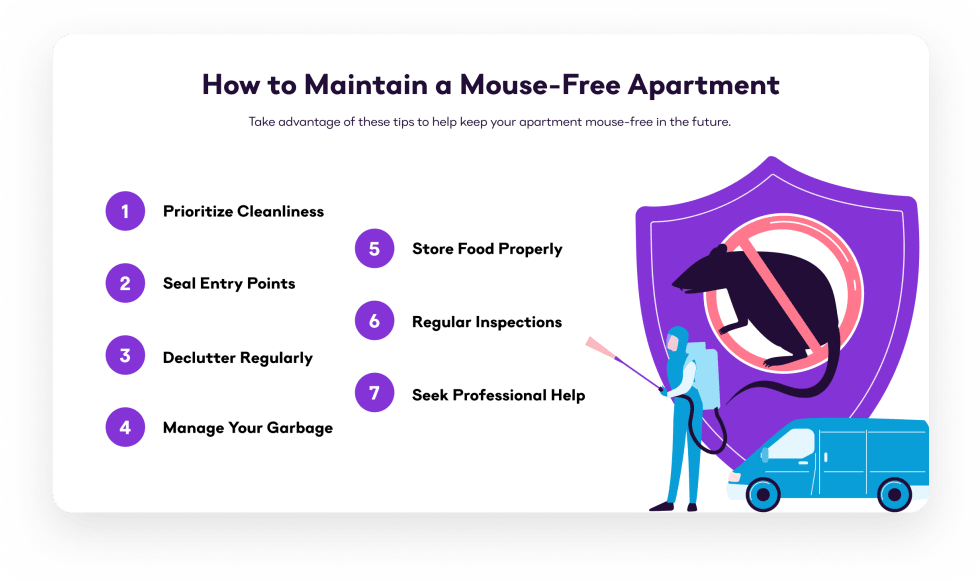South Bank at Quarry Trails
- 94 units available
- Studio • 1 bed • 2 bed • 3 bed
- Amenities
In unit laundry, Patio / balcony, Granite counters, Pet friendly, Stainless steel, Walk in closets + more

Finding a mouse in your apartment can be unsettling, but it doesn’t have to be a crisis. Catching a mouse successfully starts with finding the right trap, the best mouse bait, and addressing the issue promptly to avoid further infestation. Proper preparation is key to eliminating the mice in your apartment and making sure they don’t come back.
We’ll cover the common signs of mouse infestations, share what to know about catching mice, and provide a step-by-step guide to eliminating the problem. Don’t wait! Here’s how to get started.
One of the key reasons people choose to rent an apartment is that landlords tend to be on hand to deal with issues like pest control. So as a renter, the first thing you should do at the sign of a mouse infestation is notify your landlord and work with them to address the issue.
However, there are a lot of reasons why, after working with a landlord, you might still have pests for a while. One is that large infestations can take a long time to remove. Another is that the infestation may be more a result of the environment and not entirely within the property owners control. If that's the case, you'll need to know how to deal with pests on your own.
Before you figure out how to catch mice in your apartment, you need to make sure you know what kind of pests you’re dealing with. Here are some of the most common signs of mouse infestations.
Mouse droppings aren't always obvious if you've never had a mouse infestation before. They look similar to a blackish-brown or gray grain of rice with pointed ends. The darker the droppings, the newer they are.
Mouse urine is strong and pungent and smells similar to ammonia. It's not always noticeable unless it's in a closed space. You might confuse it for pet odor. Unfortunately, the smell can linger even after the mice are removed and you've given your apartment a good clean, so it may take some effort to completely eliminate the odor.
Catching mice isn’t always easy, especially if they’re hiding in the walls. If you notice small, dime-sized holes in your walls or baseboards, you may have mice coming in and out of your apartment. But if the holes are the size of a quarter with ragged edges, you may have rats.

If you have mice in your apartment, you'll know the expression "quiet as a mouse" isn't always accurate. When you want to trap the mouse, you should listen for where they might be in your apartment. It's common to hear mice scurrying around inside walls or scratching where they're trying to enter the apartment.
In addition to all that scratching, you may hear high-pitched squeaks that sound similar to birds chirping. Mice usually squeak when they're afraid or sense danger, so they are more likely to make noise when they get caught in a trap or face your household pet.
Mice build nests out of bits of carpet, insulation, and anything they can find that resembles bits of wood. Once they get to work, their nests look like a loose ball of the odds and ends they’ve collected.
Effective mouse traps consider the tracks and runways around your apartment that mice use to bring food and supplies back to their nest. Because they don't see that well, they use their nose to smell their way down their track or feel it out with their whiskers. If you see a runway of urine stains or footprints, you have a mouse roadmap in your apartment.
Dogs and cats can smell and hear the mice hidden away in your walls or floorboards. They're likely to scratch at the wall, sniff at it, and follow an invisible trail around the apartment trying to find the source. But cats won't always chase down a mouse and kill it. If they're well fed and have clean water, your cat is more likely to play with it before letting it go.
Before you dive into figuring out how to catch a mouse, you need to gather supplies and do some prep work.
Here’s what to know about the tools and equipment you need to catch a mouse.
Once you know what kind of traps and supplies you need, remember to practice good safety habits.
Really into DIY projects? Here's a cool homemade mouse trap you can make with a bucket:
All mouse traps, especially those that kill the mice, are highly effective at eliminating pests. The more important consideration, as we discuss below, is how you place those traps and how diligently you look after them. Moreover, you may be uncomfortable with the idea of eliminating the mice, in which case, you will obviously want to use live traps. Again, the key to success is going to be on making sure you put traps in places that the mice frequent; the type of trap can vary.
There are some safety considerations before handling a mouse trap, bait, or any pests you might catch along the way.
Beyond the safety of handling traps, remember to inspect your apartment. Make sure there are no mouse droppings near your food, water, or utensils that could inadvertently spread disease.
Now that you’ve identified you have a mouse problem and have all your gear and supplies, it’s time to learn the best way to catch mice in your apartment. Here’s how to get started.

The best way to catch a mouse usually requires multiple traps in various areas of your apartment. You can try a variety of methods, from sticky traps for mice to homemade mouse traps. If you have one mouse, it’s likely you have several, requiring more than one trap to get the job done.
Place mouse traps in tucked-away areas, like behind your stove or in the corner of your pantry. If you usually see mouse droppings in a specific area of your apartment, set up one or two traps to catch them in the act.
Don’t assume you know how to set a mousetrap just by looking it over. Always follow the packaging directions for your mouse traps. Take extra care with gloves and a face mask to avoid injury or getting your smell on the trap, which could deter mice from coming near.
Add your chosen bait to the mouse traps in your apartment. A really popular choice is peanut butter. Mice love it, it's cheap, and it sticks to the surface of the trap. You can also use different bait in your various traps to see which one is the most appealing to your critters.
If you have a snap trap, you’ll hear the trap go off while you’re home. Live traps and those that conceal the mouse after catching it make this harder to detect. Check your traps when you get home and when you wake up and dispose of any mice. It may be wise to replace used traps if the mouse was injured or the bait was especially messy.
If the idea of killing a mouse with traps in your apartment gives you qualms, and you don't want to hunt down the best mouse trap bait, there are other ways to handle it.
Once your mouse problem is under control, it’s vital to take a proactive approach to keeping them from coming back for more.
Keeping mice away doesn’t need to be complicated. Here are a few simple tips to discourage them from exploring your apartment again.

You can make trapping mice easier by cleaning your apartment first and eliminating hiding places found in clutter and dusty corners. Mice seem to follow the tracks and runways other rodents leave behind. Make sure to deep-clean your floors and the rest of the apartment and scour any areas that are active with rodents.
You may need to figure out how to catch a tricky mouse if you find entry points everywhere. Mice aren’t shy about using existing entry points their rodent pals left behind. Seal up any entry points by sticking steel wool into the holes. Add caulk around the wool to keep it in place before covering it with plaster or sealant.
Mice are attracted to cluttered and messy rooms that offer lots of places to hide and collect nesting materials. Mice also love to burrow and take advantage of old clothes and towels to burrow into. Make a point to declutter your apartment once a week to discourage mice from making themselves at home.
Leftover food scraps are a feast for mice who have no problem tearing into your trash bags to find your leftovers. Make sure to clean up after every meal and either completely seal the garbage in a bin with a lid or take it to your outdoor cans. It’s also wise to disinfect your garbage can and other food-related areas periodically.
You may not need to worry about trapping a mouse as long as you have proper food storage. If you're leaving food out in your kitchenette in cardboard containers or paper bags, mice can easily dig in and help themselves. Play defense with your leftovers and ingredients by storing them in heavy plastic containers with airtight lids. Metal and glass containers can also work.
Regardless of whether you’ve never had mice or just cleared an infestation, you need to perform regular inspections around your apartment. Look for droppings, runways, and holes that could indicate you’ve got some unwanted guests hanging around.
Sometimes dealing with mice and keeping them out should be left to the professionals. Ask your landlord about professional pest control and someone to seal up any holes. A professional can also make recommendations about how to mouse-proof your apartment to crush future problems before they start.
Figuring out how to catch a mouse isn’t hard, but sometimes you have to know when you're beat. If you're ready to get away from your rodent problems, then it's time to find the perfect home by signing up with Apartment List. With us, you’ll spend 5 minutes and save 50 hours searching.
There's no set standard for how long it takes to catch a mouse; it depends on how many mice you have, the bait you choose, and where you put the traps. It could take an hour to several days to catch a mouse. If you don’t have any luck after a week, you should try a different type of bait or trap.
Traps baited with mouse-friendly treats can usually lure a mouse out of its hiding place. Mice aren't too picky, so you can try whatever you have around your apartment, like a piece of bread, but peanut butter, nuts and seeds, and sugary sweets like marshmallows or gumdrops often work as the best mouse bait.
Experts say that if you see one mouse, you probably have at least five or six hiding out in your walls or other areas of your apartment. It is possible to just have one, but mice can have a litter of up to six pups every 20 days, so it’s more than likely that you have a family living with you.
Mice may have poor eyesight, but they are sensitive to smell. They do not like peppermint oil, cinnamon, vinegar, bleach, mothballs, citronella, or ammonia.



In unit laundry, Patio / balcony, Granite counters, Pet friendly, Stainless steel, Walk in closets + more
In unit laundry, Granite counters, Hardwood floors, Dishwasher, Pet friendly, 24hr maintenance + more